Robert V. Richardson facts for kids
Quick facts for kids
Robert V. Richardson
|
|
|---|---|
 |
|
| Born | November 4, 1820 Granville County, North Carolina |
| Died | January 6, 1870 (aged 49) Clarkton, Missouri |
| Place of burial |
Elmwood Cemetery (Memphis, Tennessee)
|
| Allegiance | |
| Service/ |
|
| Years of service | 1861 – 1865 (CSA) |
| Rank | Brigadier General |
| Battles/wars | American Civil War |
| Other work | civil engineer |
Robert Vinkler Richardson (November 4, 1820 – January 6, 1870) was a brigadier general in the Confederate States Army during the American Civil War. He played a role in several important battles.
Early Life and Career
Robert Richardson was born in Granville County, North Carolina, on November 4, 1820. When he was a child, his family moved to Hardeman County, Tennessee. As an adult, Richardson became a lawyer. In 1847, he moved to Memphis, Tennessee, to practice law. There, he worked with well-known figures like Nathan Bedford Forrest and Gideon J. Pillow.
Role in the Civil War
When the American Civil War began, Richardson joined the Confederate Army. He served under General Gideon J. Pillow. Richardson helped gather soldiers for the 12th Tennessee Cavalry, also known as the 1st Tennessee Partisan Rangers. He was chosen to be the colonel of this unit.
Key Battles
Colonel Richardson and his unit fought in major battles. They were part of the Battle of Shiloh, a very fierce fight. They also took part in the Battle of Corinth. These battles were important moments in the war.
Military Leadership
In the fall of 1863, Richardson's unit joined General Nathan Bedford Forrest's command. On December 3, 1863, Richardson was named a brigadier general. However, this appointment was later changed. For the rest of the war, his regiment was part of James R. Chalmers' command.
Life for soldiers during the war was very tough. In October 1863, Richardson sent a message describing the difficult conditions. He asked for cooking tools like skillets and pots. He also needed clothes, shoes, and blankets for his soldiers. He wrote that his men were "naked and freezing" and that he could not fight without supplies.
 | Kyle Baker |
 | Joseph Yoakum |
 | Laura Wheeler Waring |
 | Henry Ossawa Tanner |

